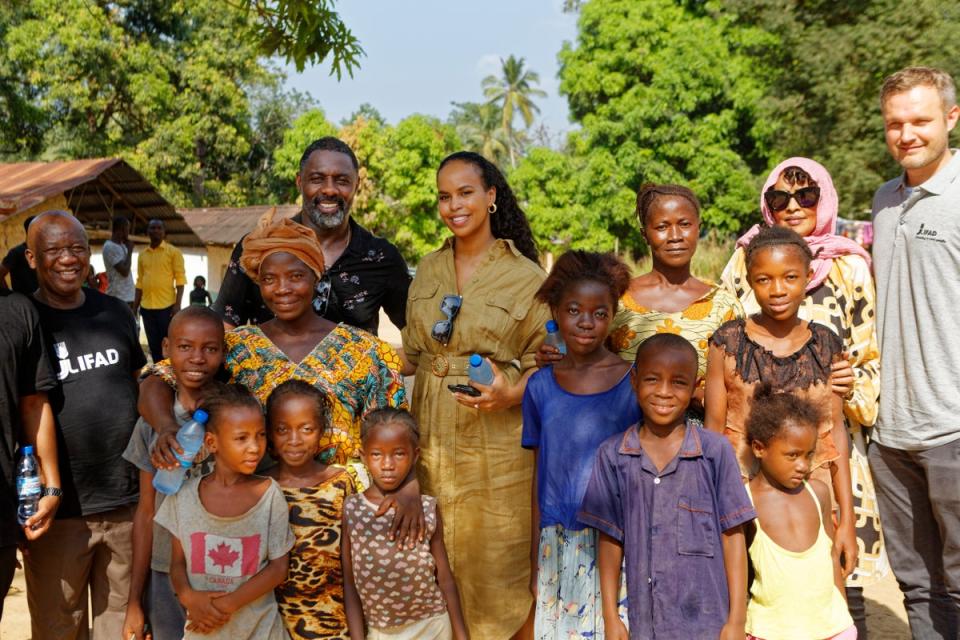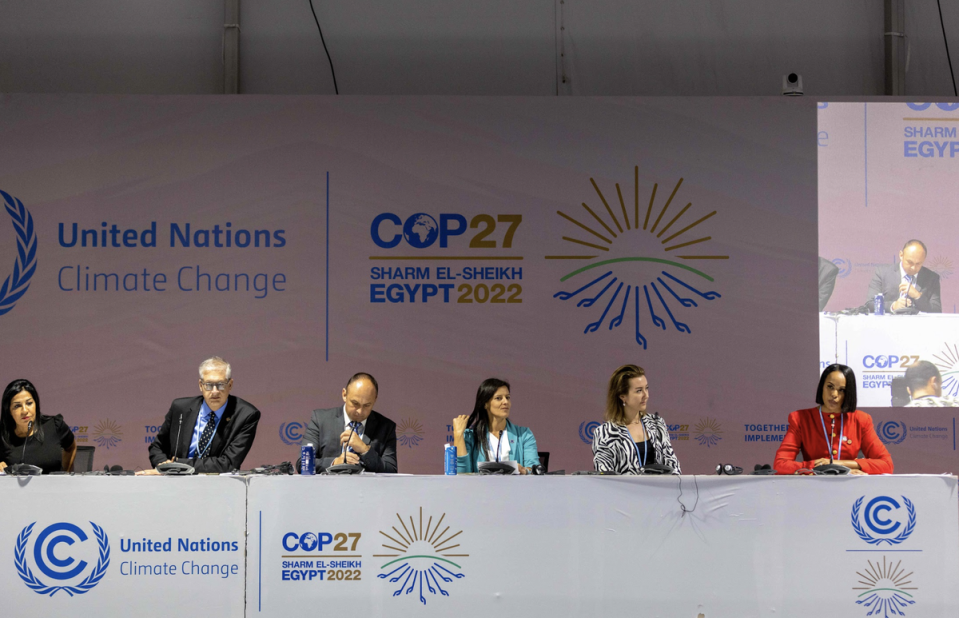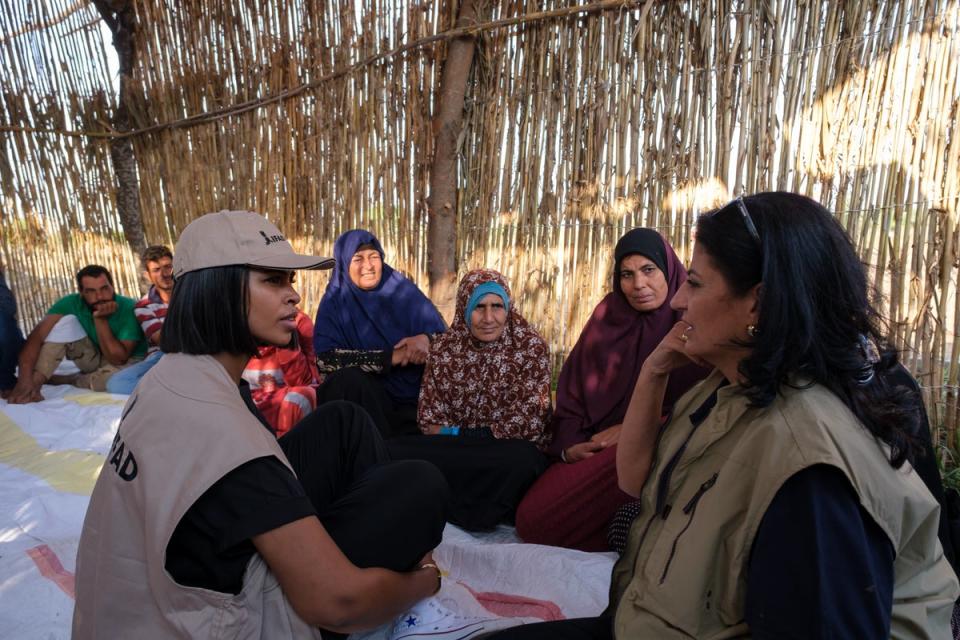‘Adapt or starve’: Sabrina Dhowre Elba on why she and husband Idris are speaking up for smallholder farmers
Sabrina Dhowre Elba admits that it probably seems “quite random” that she and her husband, the actor Idris Elba, have ended up championing the cause of rural, smallholder farmers. But she has her mom to thank for that.
“My mom grew up in a pastoral, rural community in Somalia,” the Canadian actress and model, who was appointed a United Nations Goodwill Ambassador in 2020, told The Independent.
“She always stressed the importance of giving back to Africa in some way, and what rural land and agriculture means to rural people. She actually introduced us to IFAD.”
IFAD - the International Fund for Agricultural Development - might not garner the attention or funding of bigger UN agencies but it is a vital safety-net for the world’s 500 million small farms. These largely unseen and unsung producers, mostly in developing countries, are responsible for putting one-third of the world’s food on the table.

In Africa and Asia, smallholder farmers produce a staggering 80 per cent of the food consumed. “I’m actually surprised by how many people don’t know or haven’t heard of IFAD,” Elba said. “It’s the world’s best-kept secret.”
And despite punching far above their weight, small farms receive only 1.7 per cent of climate finance - at a time when producers are buckling under extreme impacts driven by climate change.
“It’s a joke; it’s so unjust,” Elba said.
At Cop27 in Sharm el-Sheikh she joined the calls for rich countries to make good on their promise of $100bn-a-year in climate finance for developing nations, and for half of that amount to be channeled into adaptation.
Smallhold farmers were not only the “backbone of so much food production, but so many people’s livelihoods revolve around agriculture in one form or another,” Donal Brown, IFAD’s associate vice president of operations, toldThe Independent.
“Do you really want these people to have no livelihoods? What’s going to happen then?” he said. Doubling finance for the sector “would be a drop in the ocean but it would have a massive effect”.
“There’s so many simple technologies that can be used for climate-proofing and building resilience of households and communities,” he added.
Elba, who serves as Global Citizen’s Europe Board Chair, underlined the importance of supporting women and girls who are the majority of the informal agriculture market, but have far less access to resources.
“Women and girls get the short end of the straw,” she said. “They are always affected in a way that is disproportionate to men, and cultural issues in rural areas can make things even more difficult.”
IFAD not only provides educational programmes but allows women to get loans that otherwise might not have been possible, she said.
“I just want to see women and girls be empowered in a way that actually translates and seeps through to the most vulnerable people on this planet,” she told a Cop panel this weekend.
Without adequate resources, the ever-worsening cycles of extreme and unpredictable weather can push rural communities into a spiral of hunger, poverty, migration, and conflict.
In the past year, Russia’s invasion of Ukraine has thrown more volatility into the mix, upending supply chains and sending costs soaring.
More than 800 million people around the world are suffering from hunger including in Pakistan where catastrophic monsoon floods have caused nearly $4bn in damages to the agriculture and livestock sector.
An estimated 21 million people are on the brink of famine in Somalia, Ethiopia, and Kenya. The climate crisis has left the Horn of Africa in its longest-running drought in 40 years amid a fifth consecutive, failed rainy season.
On a recent trip to Somalia, Elba said that she was left in disbelief at the dire situation.
“Nothing like this [drought] had been seen before by any of the people that I spoke to,” she said. “They can’t farm, they can’t live off the land. It’s an imminent famine [and] the drought is making it so much worse.”

While relief aid organisations try to avert humanitarian disaster with immediate supplies, IFAD plays the long game.
“If these families cannot adapt to climate change, they’re gone,” Brown said. “Some may go to the cities but a lot of them will end up in Europe. It is in Europe’s own selfish interest to do something about that. Help them adapt to climate change, and build the resilience of families to be able to cope with these shocks and stresses.”
Elba’s trip to Egypt gave her the opportunity to see IFAD adaptation projects at work in the Nile Delta region.
“My favorite thing to do with IFAD is to connect with people on the ground, see the work and speak to rural people firsthand,” she said.
“These visits are massively educational for me to understand what farmers are going through in a way that is so disproportionate to what we are going through in the Global North when it comes to climate change. It is their everyday reality. It’s adapt or starve.”

The fertile farming land in one of the world’s largest river deltas is rapidly deteriorating due to climate-driven impacts like erratic rainfall, hotter temperatures and seawater intrusion.
One long-term project, from IFAD and the Egyptian Government, is lining canals to reduce the loss of irrigation water and limit the amount of saltwater seeping into the soil. The programme has helped 280,000 people so far to improve the quality and quantity of crops.
On her visit to the small village of Ibrahim el-Desouky, Elba also toured a pilot aquaponics system - an adaptation measure which allows farmers to grow where salinity has damaged the soil. The closed loop reuses water from fish tanks in hydroponics - a planting system which forgoes soil but grow crops directly in nutrient-rich water. The fish are then also eaten or sold by farmers.
The system serves as an eloquent expression of IFAD’s mission which, at the core, is about giving rural people to the opportunity to take care of themselves.
“I think that’s so important,” Elba said. “While there’s a time and place for the aid model, of course, we need long-term solutions. And investment is a long-term solution.”

